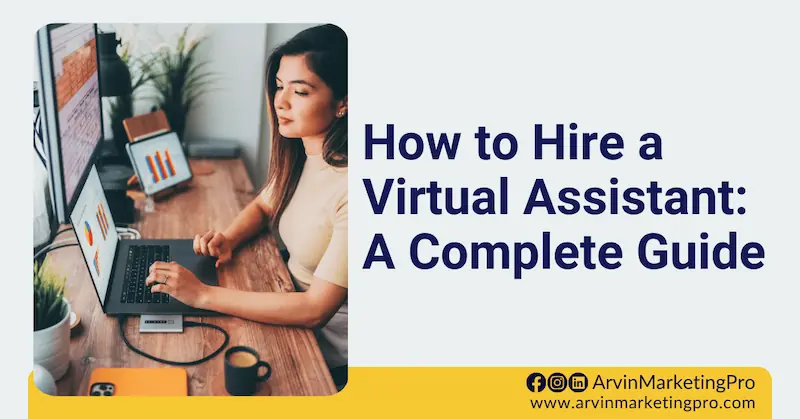Hiring a virtual assistant (VA) is a strategic move that can help business owners save time, reduce costs, and boost productivity. A VA can manage a wide range of tasks, allowing you to focus on high-value activities that grow your business. This guide will teach you exactly how to hire a virtual assistant, covering everything from identifying the right tasks for delegation to finding and onboarding the ideal candidate.
In this post, we’ll discuss why hiring a VA is beneficial, detail the steps on how to hire a virtual assistant, and explore why the Philippines has become a top location for VA hiring. By the end, you’ll know exactly how to find and hire a virtual assistant who meets your specific needs and budget.
How to Hire a Virtual Assistant for Your Business
Knowing how to hire a virtual assistant involves careful planning and a clear understanding of your business needs. Follow these steps to find the right VA for your business:
Step 1: Define the Tasks You Need Help With
Before you learn how to hire a virtual assistant, identify the tasks you want to delegate. Start by assessing your workload and pinpointing which tasks consume most of your time.
- Routine Tasks: List tasks that are repetitive and time-consuming, such as scheduling, data entry, and managing emails.
- Specialized Skills: Determine if you need skills like graphic design, bookkeeping, or social media management.
- Prioritize Tasks: Decide which tasks to delegate first based on their time requirements. This will guide you on whether you need a part-time, full-time, or project-based VA.
By clarifying your needs, you’ll know exactly how to hire a virtual assistant who aligns with your requirements.
Step 2: Set a Realistic Budget
The cost of hiring a VA can vary widely depending on location, experience, and the complexity of the tasks. Understanding how to hire a virtual assistant within your budget is crucial. For instance, Filipino VAs typically charge between $5 and $15 per hour, depending on their expertise.
Considerations for Budgeting:
- Hourly Rate vs. Project Rate: Determine if paying by the hour or per project makes more sense. Hourly rates work well for ongoing tasks, while project rates may suit short-term assignments.
- Platform Fees: Some platforms charge fees for hiring. Factor these additional costs into your budget as you learn how to hire a virtual assistant.
Step 3: Choose the Right Hiring Platform
Knowing where to find qualified VAs is a key part of understanding how to hire a virtual assistant. Here are some popular platforms:
- OnlineJobs.ph: This site is ideal if you’re focused on how to hire a virtual assistant from the Philippines, offering a subscription model with access to thousands of Filipino VA profiles.
- Upwork: A global platform where you can post jobs, receive proposals, and review candidates’ profiles, ideal for businesses looking to learn how to hire a virtual assistant for diverse tasks.
- Fiverr: Fiverr is suited for short-term projects or specific tasks. It’s a great place to learn how to hire a virtual assistant for one-off assignments, such as graphic design or copywriting.
- Virtual Staff Finder: This recruitment service specializes in connecting businesses with Filipino VAs, handling initial screening so you can learn how to hire a virtual assistant who’s pre-vetted and ready to work.
Choose a platform that aligns with your hiring needs, budget, and level of involvement. This is an essential step in mastering how to hire a virtual assistant.
Step 4: Write a Detailed Job Description
Creating a clear job description is critical for attracting the right candidates. Knowing how to hire a virtual assistant effectively includes writing a job description that leaves no room for ambiguity.
Include the Following in Your Job Description:
- Job Title: Be specific about the role (e.g., “Virtual Assistant for Content Management”).
- Duties and Responsibilities: List the tasks you want the VA to handle.
- Skills Required: Mention any necessary skills, such as Excel proficiency, familiarity with CRM software, or social media expertise.
- Work Hours: Specify if you need a VA for certain hours or offer flexible scheduling.
- Pay Rate: Clearly outline whether the pay is hourly, weekly, or project-based.
- Preferred Qualifications: Include any qualifications that would make a candidate stand out.
A well-crafted job description helps you understand how to hire a virtual assistant who is both qualified and motivated.
Step 5: Screen and Interview Candidates
Once applications roll in, it’s time to screen candidates. Understanding how to hire a virtual assistant involves evaluating candidates based on experience, skills, and compatibility with your business.
How to Effectively Screen Candidates:
- Review Resumes and Portfolios: Look for relevant experience and proof of skills, especially for specialized tasks.
- Conduct Video Interviews: Video interviews help assess communication skills and professionalism.
- Ask About Experience: Ask candidates about similar roles they’ve held to understand their work style.
- Check Availability: Ensure their hours and availability align with your needs.
Knowing how to hire a virtual assistant who can communicate well and meets your requirements will make onboarding smoother.
Step 6: Test Their Skills with a Small Task
Before making a final decision, test the candidate’s skills with a small assignment. This helps you see firsthand how they’ll handle the tasks you need.
Sample Tasks:
- Customer Service VA: Have them respond to a mock email to assess their communication.
- Content VA: Assign a short blog post or social media caption to gauge their writing skills.
- Administrative VA: Give a small data entry task to evaluate accuracy and efficiency.
Testing skills is a critical step in learning how to hire a virtual assistant who meets your quality standards.
Step 7: Set Clear Expectations and Communication Channels
Once you’ve hired a VA, setting clear expectations and establishing communication channels is essential. Knowing how to hire a virtual assistant involves ensuring they understand their role and responsibilities.
Establish Effective Communication Channels:
- Project Management Software: Tools like Asana or Trello help with task assignments and progress tracking.
- Messaging Apps: Use Slack or Skype for real-time communication.
- Regular Check-Ins: Schedule weekly or bi-weekly video calls to maintain clarity and alignment.
Clear communication ensures your VA is aligned with your goals, an essential aspect of mastering how to hire a virtual assistant.

Why You Should Hire a Virtual Assistant
Hiring a virtual assistant is a cost-effective solution for handling essential yet time-consuming tasks, freeing you up to work on critical business functions. Here are some reasons why learning how to hire a virtual assistant is essential for modern businesses:
1. Increased Productivity
A virtual assistant can manage routine tasks like scheduling, email management, and data entry. By understanding how to hire a virtual assistant effectively, you can delegate these tasks and dedicate your time to strategic decision-making and growth initiatives.
2. Cost Savings
Hiring a virtual assistant is often more affordable than employing a full-time, in-house assistant. You avoid the costs associated with office space, benefits, and equipment. Learning how to hire a virtual assistant who fits your budget allows you to save on costs while receiving high-quality support.
3. Scalability and Flexibility
Virtual assistants offer the flexibility to scale their hours and responsibilities based on your business’s needs. Whether you need someone part-time, full-time, or on a project basis, knowing how to hire a virtual assistant who can adapt to your needs is a significant advantage.
4. Global Talent Access
Learning how to hire a virtual assistant from anywhere in the world opens up a diverse talent pool. Many business owners choose to hire VAs from the Philippines, where the workforce is skilled, reliable, and cost-effective. Understanding how to hire a virtual assistant in this region can provide valuable support for your business.
Where to Hire a Virtual Assistant
When learning how to hire a virtual assistant, many business owners choose the Philippines due to its skilled, English-speaking workforce and affordable rates.
Advantages of Hiring a Virtual Assistant from the Philippines
- Strong English Proficiency: English is an official language in the Philippines, making it easy for Filipino VAs to communicate with Western clients.
- Affordable Rates: Filipino VAs typically charge between $5 and $15 per hour, providing cost-effective support.
- Cultural Compatibility: Filipino VAs are known for their adaptability and professionalism, traits that make them valuable for Western businesses.
- High Educational Standards: The Philippines has a robust education system, and many VAs hold degrees in fields like business, marketing, and finance.
- Experience with Global Clients: The Philippines has a strong Business Process Outsourcing (BPO) industry, so many VAs are familiar with client communication and time management.
Understanding how to hire a virtual assistant from the Philippines can give you access to skilled, reliable professionals at competitive rates.
Top Platforms for Hiring Filipino Virtual Assistants
If you’re interested in how to hire a virtual assistant from the Philippines, here are some platforms that cater specifically to Filipino VAs:
- OnlineJobs.ph: An exclusive job board for Filipino remote workers, perfect for businesses focused on how to hire a virtual assistant from the Philippines.
- Virtual Staff Finder: This service provides pre-vetted Filipino VAs, streamlining the hiring process for those learning how to hire a virtual assistant.
- Upwork: Although not exclusive to the Philippines, Upwork allows you to filter candidates by location, making it ideal if you’re interested in how to hire a virtual assistant from a specific region.
- Fiverr: This platform is excellent for short-term projects or one-time tasks, helping you understand how to hire a virtual assistant for specific needs.
- Facebook Groups and LinkedIn: Many Filipino VAs use social media to connect with clients, offering a direct way to learn how to hire a virtual assistant for a variety of tasks.
Related Article: Smart Choice: Hiring Virtual Assistant in the Philippines
How to Hire a Virtual Assistant: Tips for Success
To master how to hire a virtual assistant, follow these tips for a successful hiring process:
- Prioritize Relevant Skills and Experience: Focus on candidates whose skills align with your needs, whether it’s administrative work, customer service, or content creation.
- Check References and Portfolios: Reviewing feedback from past clients helps you gauge a candidate’s reliability and work quality.
- Consider Time Zone Differences: Ensure your VA is comfortable working during your business hours or set expectations for asynchronous communication.
- Assess Communication Skills: Strong communication is essential for remote work. Make sure the candidate can effectively follow instructions and provide updates.
- Clarify Payment and Contract Terms: Be transparent about pay and use secure payment methods, like PayPal or Upwork’s escrow system, for a smooth financial arrangement.
These tips will help you understand how to hire a virtual assistant who meets your needs and integrates seamlessly into your business.
FAQs on How to Hire a Virtual Assistant
1. How Much Does a Virtual Assistant Cost?
Costs vary, but Filipino VAs typically charge between $5 and $15 per hour, making them an affordable option for most businesses.
2. How Do I Manage a Virtual Assistant Remotely?
Use project management tools, regular check-ins, and communication apps like Slack or Skype to ensure tasks are on track.
3. What Skills Should I Look for in a VA?
Look for skills relevant to your needs, such as time management, task-specific skills, and communication abilities.
4. How Can I Ensure Data Security with a VA?
Limit access to sensitive information and use tools like LastPass for password sharing. Consider an NDA for added security.
5. How Many Hours Do I Need a Virtual Assistant?
Many businesses start with 10–20 hours per week, adjusting as necessary based on workload and VA productivity.
